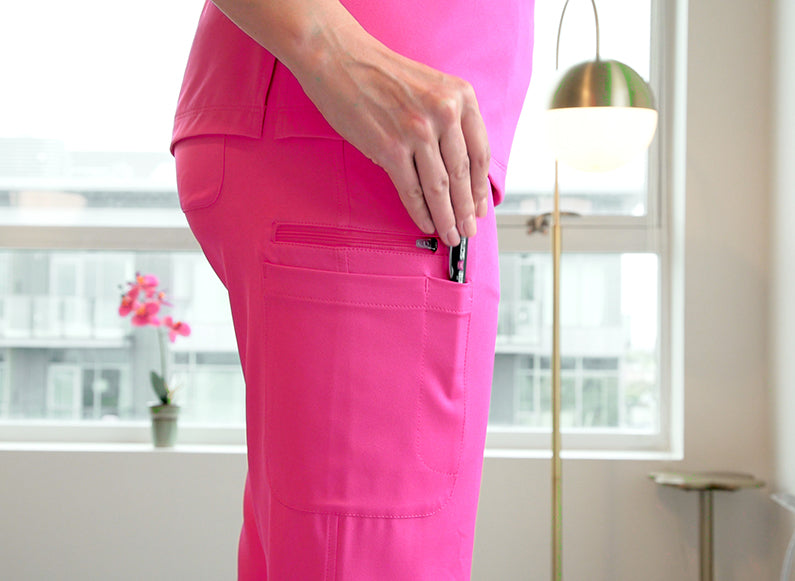Written by Susannah Marshall, BSN, RN-BC, CCM
We all know at least one ultra-efficient nurse who seems to have endless energy, efficiently completing long lists of tasks, all of which seem impossible as a new nurse or nursing student.
Chances are, their lightning fast pace also came with a level of harshness or poor communication skills. While the go-go-go mentality appears to be the best way to get it all done, studies show taking breaks and breathers throughout your shift not only increases your own resilience and health, they increase productivity while reducing the chance of making mistakes due to over-tiredness.
Let's dive into why it's so hard for nurses to take breaks, and tools to stay centered throughout your shift.
Why Perfectionism Needs to Take a Long Walk Off of a Short Pier
Some nursing instructors came from a generation when nurses were treated as “just a nurse.” They had to work much harder to prove their worth as a valued member of the patient care team.
The good news is, progressive strides to dismantle inappropriate patriarchal culture in recent decades. Doctors are no longer treating nurses like expendable servants. But, the historical precedent of working non-stop to prevent physician tantrums and nurse mistreatment is so ingrained that some nurses can’t leave overworking behind. There is still room to radically reform nursing culture with the goal of efficiently delivering safe patient care without sacrificing nurses’ mental health and well-being in the process.
Why Nurses Resist Taking Breaks
Studies have repeatedly shown that nurses perform better when they take breaks, but the cultural push to overwork is strong. Nurses commonly skip breaks as a result of the old-school workaholic mentality, to create the sense of higher status, and appear invincible.
Which one of these lines have you said to yourself or others?
-
"If I just do this one more thing... I’ll be caught up…" (Spoiler: This can go on for perpetuity, as there is always "one more thing…")
-
"I don’t have time. There’s too much to do, and we are understaffed, so I’ll just keep going."
-
"I’m on a roll. It’ll get it done faster if I just keep going.”
-
"It’s easier for me to just do it, instead of explaining to someone else what needs to be done."
-
"I’m not hungry, I’m fine."
-
"I love taking care of this patient, so I’ll just work a little bit longer."
-
"I made a mistake and got behind, which was my fault 一 so I need to work extra hours to make up for my mistake." (The mistake may have happened because we were too tired and haven’t taken a break.)
-
“People will think I am slacking if I take a break, and I want to pull my own weight."
3 “Pseudo” Breaks to Do in 15 Seconds or Less
We can talk all day long about the importance of taking breaks, how it is safer and healthier for nurses and patients alike, but cultural pressures coupled with strong work ethic makes taking a break difficult. If necessary, nurses can take “pseudo” breaks while continuing to work. It is not ideal, of course. If you can take a break, by all means take that break! But, pseudo breaks lasting about 15 seconds are better than no breaks at all, so here are a few ideas to get you started. If you don’t have even 10-15 seconds to take a “pseudo” break, that is a gentle signal that a break is needed now, more than ever.
1. Box Breathing
Box breathing is a technique that Navy Seals use to help calm their nervous systems so they can think as clearly as possible under enormous amounts of stress. This is a form of deep breathing where you take one slow inhale, holding it at the top for a few seconds, then followed by a slow exhale, and holding it for a few seconds at the bottom. This stimulates your vagus nerve, which turns on the parasympathetic nervous system that provides a calming sensation. I can always tell when it’s working because my shoulders immediately drop after holding my breath for even a few seconds.
Caution: some people get dizzy the first few times they try different kinds of deep breathing, especially ones that involve holding your breath. Go slowly and only do one or two breaths at a time. Stop if you feel dizzy or discomfort.
Times when you can do box breathing while working:
-
While charting
-
After you take a sip of water
-
Every time you go to the supply closet
-
Before you administer medication
-
Riding the elevator
-
Texting your Mom/friend etc.
-
Waiting for your coffee to be brewed
2. Compassionate breathing
Dr. Kristin Neff, renowned psychologist who studies the effects of self-compassion, teaches many different types of compassionate breathing that include internally saying mantras while breathing in and out. One that is easy to use is called “Breathing with Equanimity” or “Self-compassion for Caregivers.” As you breathe in, you say to yourself, “I am breathing in for me,” and as you breathe out you say, “I am breathing out for you.” You can even shorten it to “In for me, out for you.” You don’t have to do any special kind of breathing, but it helps to mindfully pay attention to both the in and out breath.
These breathing techniques can be incredibly helpful, especially when working with an upset patient. These are great tools for a “pseudo” break because it’s possible to still pay attention to patients, while taking a moment to ground yourself in the moment.
3. Cultivating kindness and grace toward yourself
Dr. Neff teaches that one way to cultivate kindness toward yourself is by “speaking (and thinking!) kindly about yourself.” Often, we are hard on ourselves without even realizing it. But, if we pay attention to our thoughts and catch ourselves saying something negative, we can take a moment to rephrase our concern in a more productive light. This saves time and energy, and keeps us moving in the right direction.
So, instead of saying “I can’t believe I overslept and missed my bus. That was so stupid of me!” you can say something like “Ugh, I’m so bummed I missed my bus. This really sucks. I must have been really tired. I should let my boss know that I am on my way, and try to get some extra sleep tonight so hopefully this won’t happen again. Even though I overslept, I am still a good nurse and care about my patients. I just made a mistake, like all people do from time to time.” Here are Dr. Neff’s five tips for cultivating kindness toward ourselves:
-
Spend time doing things you truly enjoy
-
Forgive yourself for your mistakes
-
Strive to avoid judgments and assumptions
-
Take care of your mind and body
-
Cultivate acceptions (even for your flaws)
Fortunately, these three kinds of “pseudo” breaks can be done quickly without anyone noticing, while also having a positive effect on our mood and energy levels. Of course, taking a full break from working is the preferred method of taking a break. But if you are in a pinch, be sure to try a 15 second “pseudo” break and write in the comments about how it worked for you!
About the Author:
Susannah Marshall, BSN, RN-BC, CCM has been a Registered Nurse for 8 years, and is board certified in both case management and psychiatric nursing. Prior to becoming an RN, she worked for 10 years with children in social service settings, where she became passionate about patient advocacy and de-stigmatizing mental healthcare needs. When she isn’t practicing Argentine tango or west/east coast swing dancing, she loves to play with her baby nephew and write children’s stories.
Resources & References:
ANA Nurse Fatigue Position Statement 2014 https://www.nursingworld.org/~49de63/globalassets/practiceandpolicy/health-and-safety/nurse-fatigue-position-statement-final.pdf
Healthline Box Breathing https://www.healthline.com/health/box-breathing
Cleveland Clinic Box Breathing https://health.clevelandclinic.org/box-breathing-benefits/
Compassionate breathing https://self-compassion.org/category/exercises/
Dr. Neff video on breathing with equanimity https://www.youtube.com/watch?v=jJ9wGfwE-YE
Dr. Neff Facebook posting about cultivating kindness toward ourselves https://www.facebook.com/100044581802782/posts/386157559546968/





